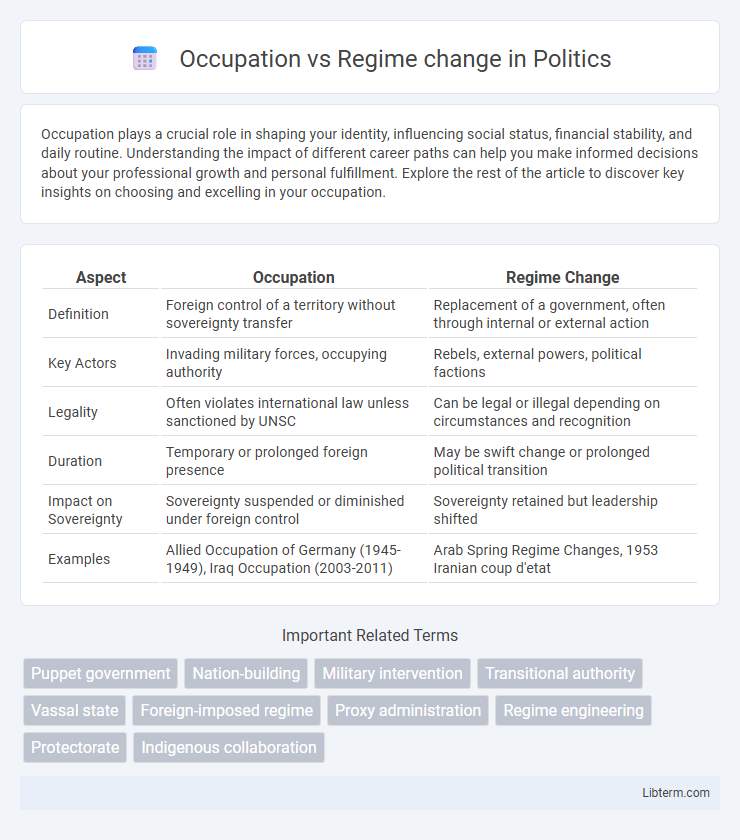Occupation plays a crucial role in shaping your identity, influencing social status, financial stability, and daily routine. Understanding the impact of different career paths can help you make informed decisions about your professional growth and personal fulfillment. Explore the rest of the article to discover key insights on choosing and excelling in your occupation.
Table of Comparison
| Aspect | Occupation | Regime Change |
|---|---|---|
| Definition | Foreign control of a territory without sovereignty transfer | Replacement of a government, often through internal or external action |
| Key Actors | Invading military forces, occupying authority | Rebels, external powers, political factions |
| Legality | Often violates international law unless sanctioned by UNSC | Can be legal or illegal depending on circumstances and recognition |
| Duration | Temporary or prolonged foreign presence | May be swift change or prolonged political transition |
| Impact on Sovereignty | Sovereignty suspended or diminished under foreign control | Sovereignty retained but leadership shifted |
| Examples | Allied Occupation of Germany (1945-1949), Iraq Occupation (2003-2011) | Arab Spring Regime Changes, 1953 Iranian coup d'etat |
Understanding Occupation and Regime Change
Occupation refers to the control and administration of a territory by a foreign military power, often temporary and enforced by force without the consent of the local population. Regime change involves the replacement or significant alteration of a country's leadership or political system, typically driven by internal dynamics or external intervention aiming for political transformation. Understanding the distinction highlights that occupation maintains existing governance under foreign control, while regime change reshapes political structures and authority within the state.
Key Definitions: Occupation vs Regime Change
Occupation refers to the control of a territory by foreign military forces without transferring sovereignty, maintaining the existing regime under external authority. Regime change involves the deliberate replacement or overthrow of a government or ruling authority, often through external intervention or internal revolution. Key distinctions lie in sovereignty retention during occupation versus sovereignty disruption during regime change, impacting international law and political stability.
Historical Contexts of Occupation
Historical contexts of occupation reveal varied impacts on political, social, and economic structures, often serving as precursors to regime change. Occupations such as the Allied control of Germany post-World War II or the U.S. occupation of Japan resulted in comprehensive political restructuring and democratization efforts. These occupations typically involve foreign military presence enforcing control, leading to either the installation of new political regimes or significant alterations in existing governance frameworks.
Historical Examples of Regime Change
Historical examples of regime change often involve the forced replacement of a country's leadership, such as the Allied occupation of Germany and Japan after World War II, which led to the establishment of democratic governments. The Soviet occupation of Eastern Europe post-World War II resulted in communist regimes replacing previous governments across Poland, Hungary, and East Germany. Similarly, the U.S.-led invasion of Iraq in 2003 caused the overthrow of Saddam Hussein's regime, sparking prolonged conflict and efforts to build a new political system.
Legal Frameworks: International Law Perspectives
International law distinguishes occupation and regime change through distinct legal frameworks, primarily governed by the Hague Regulations of 1907 and the Fourth Geneva Convention of 1949, which regulate the responsibilities and limitations of an occupying power. Occupation under international law is defined by effective control over a territory without sovereign authority transfer, emphasizing the protection of civilian populations and maintenance of public order. Conversely, regime change, often involving sovereignty alteration or installation of new governments, typically falls outside the scope of occupation law and raises complex issues regarding the legality of interference and the principles of non-intervention enshrined in the UN Charter.
Motivations Behind Occupation and Regime Change
Motivations behind occupation often stem from strategic interests such as securing resources, expanding territorial control, or neutralizing perceived threats, while regime change primarily targets altering the political structure to install a compliant or ideologically aligned government. Occupations typically emphasize military dominance and resource exploitation, whereas regime change seeks to reshape governance, often through external intervention or support for opposition groups. Understanding the distinct aims clarifies why occupiers may resist dismantling existing institutions, while regime change agents focus on political legitimacy and power consolidation.
Political and Ethical Implications
Occupation often involves the direct control of a territory by foreign military forces, raising significant political and ethical implications related to sovereignty, self-determination, and legitimacy. Regime change, particularly when externally imposed, challenges international norms by undermining established governments and may provoke ethical debates over interventionism and the disruption of political processes. Both scenarios critically impact the affected population's rights and the international community's responsibility to uphold justice and stability.
Societal Impact on Local Populations
Occupation often results in significant disruption to local governance, economy, and social institutions, leaving populations vulnerable to resource scarcity and reduced civil liberties. Regime change can lead to shifts in political power structures, sometimes fostering social reform but also potentially causing instability or factional conflict. Both scenarios deeply impact identity, community cohesion, and long-term development prospects for affected societies.
Long-term Outcomes of Occupation and Regime Change
Long-term outcomes of occupation and regime change vary significantly, with occupations often leading to prolonged instability and resistance due to foreign control, whereas regime changes can result in either democratization or authoritarian entrenchment depending on domestic political dynamics. Historical examples, such as post-World War II Japan's occupation facilitating democratic reforms versus Iraq's 2003 occupation leading to insurgency, highlight how the nature of control influences political and economic trajectories. Sustainable recovery and governance reforms depend on local institutional capacity and the extent of external involvement post-intervention.
Lessons Learned: Case Studies and Future Implications
Case studies analyzing occupation versus regime change reveal significant lessons in governance stability, local population impact, and international law adherence. Successful occupations prioritize inclusive governance, infrastructure rebuilding, and cultural sensitivity to prevent insurgency and foster long-term peace. Future implications emphasize multilateral collaboration, comprehensive post-conflict planning, and respect for sovereignty to improve outcomes in similar geopolitical interventions.
Occupation Infographic

 libterm.com
libterm.com